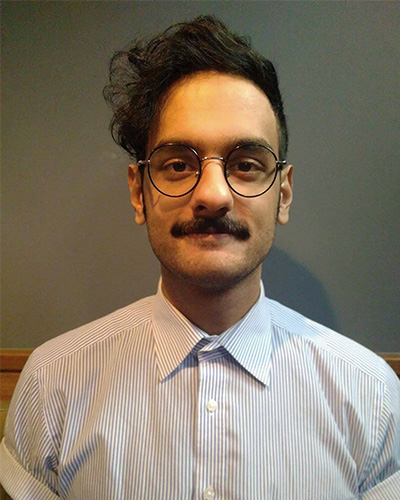Mainstreaming Sustainable Consumption: Practices, Perspectives, and the Case of Food

Vishal Parekh at the Department of Sustainable Development, Environmental Science and Engineering, will publically defend his doctoral thesis on 26 September 2025.
What is the topic of your Doctoral Thesis?
The topic is essentially how to make sustainable consumption – especially food consumption – the new normal in Sweden. More specifically, the thesis focuses on how sustainable (food) consumption can be understood as well as the perspectives and roles of households and societal actors like food provisioning companies and nonprofits in making it the mainstream in Sweden. The work is theoretically underpinned by social practice theory and concepts of power and recognitional justice, and the methods used are mainly interviews, an intervention study, and workshops.
Why did you choose this topic?
I wrote my thesis within the research program Mistra Sustainable Consumption – from niche to mainstream. What drew me to the program was its ambition to not only understand change, but contribute to making change. The way I've looked at it in my research, consumption, in a sense (but not alone, of course), lies at the heart of the unsustainability of capitalist societies like ours. Food consumption, in particular, sits at the intersection of so many aspects of this unsustainability as well as of our lives as social beings. The interplay between the structures that shape the way we do things and the agency to do things differently interests me, and eating is a deeply personal and everyday practice that is also very prominently structured by sociocultural and material conditions.
What are the most important results?
It's important that the normal ways of thinking and talking about what sustainable consumption is and should be in the future in public discourse and policy and parts of academia be challenged. Notions of recognitional justice are central here – in order to have our ideas of sustainable consumption be shaped by those whose voices are currently not heard on the matter, as well – as are the power relations between households and larger actors in our society. I argue that too much responsibility is currently being placed on individuals and households to make changes to their eating habits, in particular, since the structural factors that limit the possibility of this happening on a larger scale – social norms, financial disincentives, the prevalence of unsustainable instead of sustainable foods, for example – are mainly under the influence of larger actors. So, it's crucial that societal actors in the private and public sectors as well as civil society coordinate to a much greater degree than they currently do.
Who will benefit from your results? What kind of impact may it have on surrounding society?
I've strived to have my research be beneficial not only within academia but in practice as well. "Practice", here, mostly refers to public policy makers, nonprofits, and food provisioning actors who want to shift food consumption patterns towards sustainability in Sweden. On the one hand, the thesis indicates effective strategies that, for example, environmental nonprofits or retailers and restaurants can employ to try to influence food consumption patterns. It simultaneously encourages a shift in thinking about such efforts away from persuading individuals to change and towards coordinated efforts to bring down structural barriers and create the preconditions for households to eat sustainably and practice other sustainable forms of consumption in ways that don't relegate them to the role of passive consumers, but as active participants in the way resources are used in society.
What will you do next and where can one reach you?
I'll work on a related research project for the remainder of this year while I look for further research opportunities, hopefully as a post doc! I aim to carry on with some of the themes I've explored so far – like issues of power and justice in shaping society towards sustainable futures – as well as bring in themes that I've so far only touched on in my teaching, such as multispecies justice, again within the context of sustainable futures. The best way to reach me is probably through LinkedIn: www.linkedin.com/in/parekhvishal .
